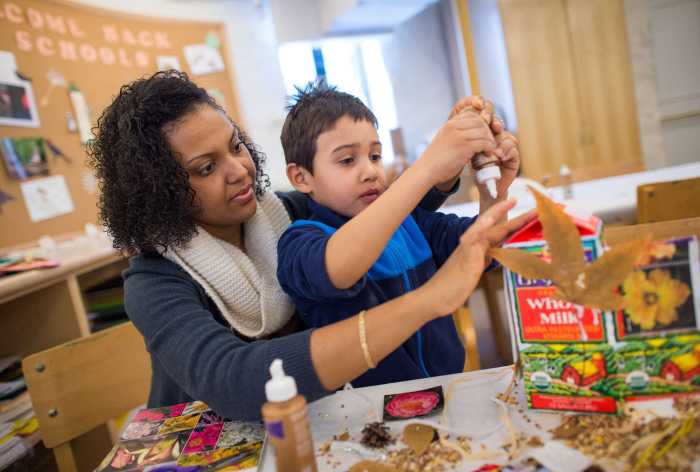
Andrew Solomon and his husband, John Habich, are part of a charmingly unconventional modern family: “four children, five parents, across three states,” as Solomon is fond of saying. He and Habich are fathers to 4-year-old George here in New York; Habich has two biological children who live with their mothers (a lesbian couple) in Minnesota; and Solomon’s daughter, whom he and a close friend from college chose to conceive together, lives with her mother in Texas. Theirs is a complicated and intentional act of family building, predicated on a kind of trust, respect, commitment, and love that pushes beyond the bounds of traditional forms of family. It’s a life that’s been hard won for Solomon, one that he literally wrote his way into while working on his monumental new book, Far From the Tree: Parents, Children, and the Search for Identity, for more than a decade.
That the born-and-bred New Yorker should find love and happiness through a book isn’t exactly surprising. A prolific and vociferous writer, Solomon worked as a journalist and writer for the New York Times Magazine for nearly ten years covering a wide scope of subjects: the art world in Soviet Russia, politics in Libya and Afghanistan, mental illness, gay rights, stepfamilies, and more. His book on depression, The Noonday Demon, won the National Book Award in 2001 and was a runner-up for the Pulitzer Prize. The author laughs as he recounts the family lore that little George’s first word was “book.” “Shouldn’t it have been ‘Daddy’?” a friend had queried, to which Solomon’s partner jokingly replied: “In our house, book is Daddy.”
As the homosexual child of straight parents for whom having a gay child was upsetting, Solomon began this book with the realization that he was in the company of a surprisingly large and diverse group of others who, like him, were born very different from their parents—deaf children born to hearing parents, for example, or dwarfs born to parents of average height. These people had needed to fight for acceptance in a world that wished them not contentment, but cure. On assignment for an article that he was writing for the New York Times in 2003, Solomon was first struck by the similarities between gay culture and deaf culture. Both deafness and being gay have been marginalized identities that, for reasons of surgical advancements or social prejudices, have been threatened with extinction. And yet, deafness and homosexuality have emerged into vibrant and valuable identities for many people. What other identities were similarly marginalized, he wondered? What does it mean when children are born wildly, and sometimes disturbingly, different from their parents? What can we learn from these experiences?
Framed by his personal journey, Solomon presents the stories of 300 families that struggle with widely divergent challenges in Far From the Tree: transgender children born to gender-normative parents, babies born with Down Syndrome or multiple severe disabilities, autistic or schizophrenic sons and daughters, kids who become criminals, and children conceived from rape. Over the course of the ten years that it took to research his book, Solomon discovered that most of the families were able to pull it together remarkably well despite, and perhaps because of, the struggle. “My book is about families who ended up grateful for these experiences they had wanted to avoid,” Solomon says.
That being said, at its core, Far From the Tree is about all families. As Solomon argues, all parents give birth to children who are not them. For the author, the idea that difficulty within one’s family was not a flaw but an inevitability came as a relief, one that freed him of his fear of messing up with his own children and also allowed him to heal some of his past hurt. “I have yet to meet any parent who hasn’t occasionally looked at his child and thought, where do you come from?” he remarks. “That understanding allowed me to see that my own parents were bewildered and confused, and perhaps this was all part of the fabric of parental love.”
It’s this kernel of insight that helped Solomon embrace the possibility of parenthood in all its glorious and messy complexity, in the same way that it pushed him to advocate for a world in which there’s infinite scope for human difference. But that isn’t to say that his children don’t continually surprise him, or that he always gets it right, but he’s learned to see that error is inevitable in parenting and that getting through difficulties with one’s children is a very bonding experience. “If George had never cried and had never needed comfort,” he says, “I wouldn’t have the relationship with him that I have now… The fact of the crying, the fact of even sometimes having to say things that made him cry because limits needed to be set or he had to learn—that’s all part of where bonding takes place. It wouldn’t be the same if it were only playing with cars and trucks, delightful as that may be.”
George, meanwhile, does play delightfully with cars and trucks. He softly motors his John Deere tractor across the floor. He shows off his Thomas the Tank Engine set, and he helps take photos of his daddy and papa. They fall over themselves, making funny faces to the camera, trying to make their son laugh harder. Solomon says that, unlike George, he was a bit “neurotic, strange, and anxious” as a child.
“I’m sure we’ll see more ways in which he’s different from us as he gets older,” Solomon says, “but for the moment, it’s that exuberance that he has in this glorious way, and his exuberance, of course, makes me very joyful, too.”
Visit andrewsolomon.com
For more Dads We Love, view our slideshow.



















